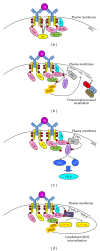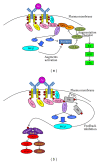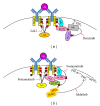Does B cell receptor signaling in chronic lymphocytic leukaemia cells differ from that in other B cell types?
- PMID: 25101192
- PMCID: PMC4102070
- DOI: 10.1155/2014/208928
Does B cell receptor signaling in chronic lymphocytic leukaemia cells differ from that in other B cell types?
Abstract
Chronic lymphocytic leukaemia (CLL) is an incurable malignancy of mature B cells. CLL is important clinically in Western countries because of its commonality and because of the significant morbidity and mortality associated with the progressive form of this incurable disease. The B cell receptor (BCR) expressed on the malignant cells in CLL contributes to disease pathogenesis by providing signals for survival and proliferation, and the signal transduction pathway initiated by engagement of this receptor is now the target of several therapeutic strategies. The purpose of this review is to outline current understanding of the BCR signal cascade in normal B cells and then question whether this understanding applies to CLL cells. In particular, this review studies the phenomenon of anergy in CLL cells, and whether certain adaptations allow the cells to overcome anergy and allow full BCR signaling to take place. Finally, this review analyzes how BCR signals can be therapeutically targeted for the treatment of CLL.
Figures




References
Publication types
LinkOut - more resources
Full Text Sources
Other Literature Sources

